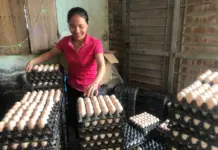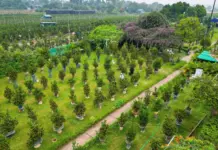That day was a Saturday. I went to the Bai Truoc Beach in Vung Tau that afternoon and saw groups of people sitting on the seawall, which had been set up years ago to prevent the seawater from encroaching on the coastal road.
Down on the beach, many people were playing in the water.
A casual observer would never have guessed the city had just ended a social distancing and self-isolation order. A week ago, the beaches of Vung Tau were empty. Of course, some of the city’s residents still went swimming there, but they had to sneak around and stay two meters apart.
Vung Tau is a hot spot for weekend tourists from HCMC, with the young and old alike arriving en masse to swim or simply enjoying the fresh air. The city has seen the arrival of these tourists for the last five or six years, since the expressway connecting HCMC and neighboring Dong Nai Province’s Long Thanh was opened to traffic.
As workers currently have up to four days off for the national holidays and social distancing and self-isolation have reached a partial end, Vung Tau has become crowded again. However, the beaches are still off-limits.
The prices of services and hotel rooms have not increased. A standard room still costs VND300,000 and a deluxe room costs VND2 million, even though hotels are full.
Despite the opportunity available to increase prices, sellers have not done so. Thus, they have created a sustainable way of doing business, which is drastically different from places where sellers see crowds as an opportunity to raise prices.
The Royal coffee shop at the Bai Truoc Beach, where I usually sit down for a cup of coffee in the morning, has not revised up its prices either. It is still VND20,000 for a cup of black coffee.
The same is true at the Quang Noodle shop and the Pho Bac noodle stall, a stone’s throw from my apartment in the center of the city, where you can get a Center of Vietnam noodle bowl for VND35,000 and a northern noodle bowl for VND30,000, respectively.
To me, those prices are affordable.



